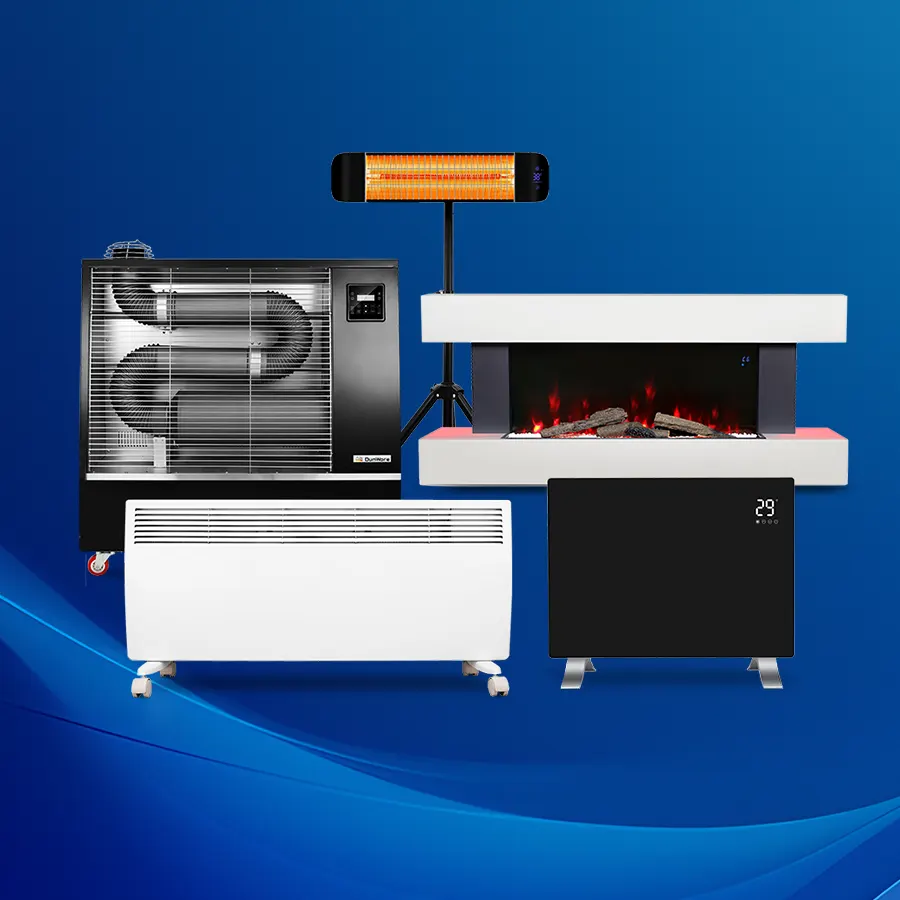Escolhendo entre um refrigerador de ar e um ar condicionado (AC) pode ser complicado. Ambas são opções populares para resfriar espaços internos, mas eles operam de maneira diferente e trazem benefícios e desafios únicos. Neste guia, vamos quebrar as diferenças, ajudando você a tomar uma decisão informada com base em suas necessidades. Vamos mergulhar no diferença entre refrigerador de ar e ar condicionado e veja qual combina com seu estilo de vida.
Refrigerador de ar explicado
O que é um refrigerador de ar?
Um refrigerador de ar é um dispositivo projetado para diminuir a temperatura do ar em um doméstico, ar livre, ou espaço industrial. Funciona usando o princípio do resfriamento evaporativo, onde o ar quente passa sobre almofadas encharcadas de água, fazendo com que a água evapore e resfrie o ar. Eles são particularmente eficazes em ambientes secos, climas quentes, mas pode ser menos eficaz em ambientes úmidos.
Como funcionam os refrigeradores de ar?
Refrigeradores de ar são uma ótima opção para quem procura uma solução de refrigeração com baixo consumo de energia e econômica. Esses dispositivos dependem resfriamento evaporativo, um processo onde a água absorve o calor do ar e o resfria. Aqui está uma rápida olhada em como eles funcionam:
- Resfriamento Evaporativo: Os refrigeradores de ar puxam o ar quente, passe-o por uma almofada de resfriamento úmida, e depois solte o cooler, ar mais confortável na sala.
- Interação Água e Ar: A chave para a eficiência do refrigerador é como a água interage com o ar. À medida que a água evapora das almofadas, absorve calor, diminuindo a temperatura do ar que sai.
Tipos de refrigeradores de ar
Há alguns tipos diferentes de refrigeradores de ar disponível, cada um projetado para necessidades específicas:
- Refrigerador do Deserto: Ideal para seco, climas quentes, refrigeradores de deserto são grandes, unidades poderosas que resfriam salas inteiras usando uma quantidade significativa de água.
- Refrigerador de pântano: Comumente usado em áreas com calor moderado e ar seco, refrigeradores de pântano são eficientes no resfriamento, mas são limitados em áreas com alta umidade.
- Refrigerador de ar pessoal: Menor, portátil, e adequado para resfriar apenas uma pessoa ou uma pequena área, refrigeradores pessoais são compactos e energeticamente eficientes.
Ar condicionado explicado
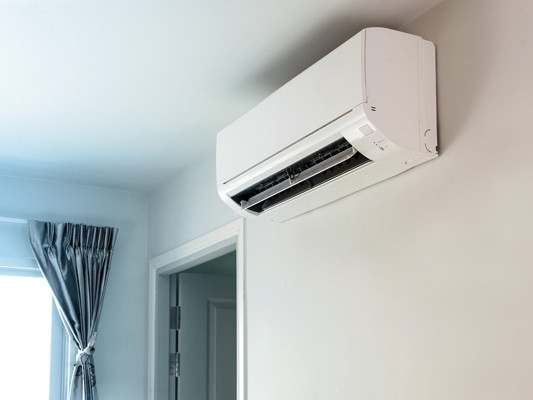
O que é um ar condicionado?
Um ar condicionado(AC) é um dispositivo que resfria e desumidifica o ar em um espaço fechado usando um ciclo de refrigeração. Funciona circulando refrigerante através de um compressor e bobinas do evaporador, absorvendo o calor do ar e expelindo-o para fora. Os condicionadores de ar são altamente eficazes em climas úmidos e secos, fornecendo resfriamento poderoso e consistente.
Como funcionam os condicionadores de ar?
Os condicionadores de ar são um sistema mais complexo em comparação com os refrigeradores de ar. Veja como eles funcionam:
- Ciclo de refrigerante: Os ACs usam um refrigerante para absorver o calor do ar dentro de uma sala e transferi-lo para fora. O refrigerante passa por um ciclo de compressão e expansão, que reduz a temperatura do ar.
- Transferência de calor: O calor do interior da sala é transferido para a unidade externa através de bobinas, deixando o ar fresco para trás.
Tipos de condicionadores de ar
Existem vários tipos de condicionadores de ar para escolher, dependendo de suas necessidades de resfriamento:
- Ar condicionado de janela: Instalado em uma janela, esta é uma opção compacta e acessível para resfriar ambientes individuais.
- Ar Condicionado Central: Melhor para resfriar casas inteiras ou grandes espaços, os sistemas de ar central são mais caros, mas fornecem, resfriamento generalizado.
- Ar condicionado portátil: Um flexível, opção móvel que permite resfriar ambientes sem instalação permanente.
Diferença entre refrigerador de ar e ar condicionado
Escolhendo entre um refrigerador de ar e um ar condicionado (AC) às vezes pode ser complicado, especialmente se você não sabe como cada sistema funciona ou como eles se comparam em diferentes aspectos. Ambos os sistemas de refrigeração são amplamente utilizados, mas eles diferem em termos de custo, eficácia, e consumo de energia. Aqui está uma análise detalhada das principais diferenças entre refrigeradores de ar e condicionadores de ar para ajudá-lo a tomar uma decisão mais informada.
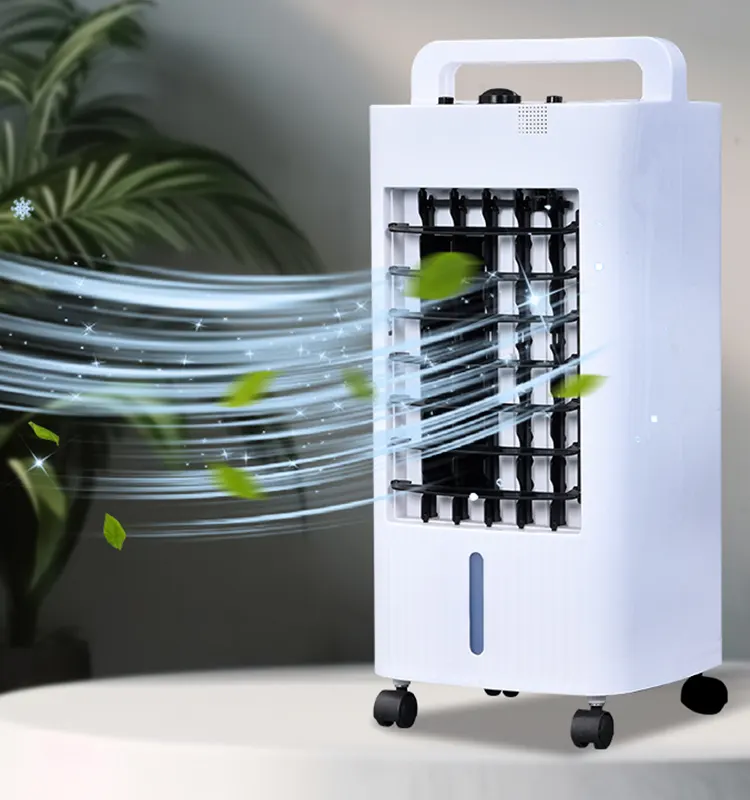
#1: Custo
- Refrigerador de ar: Uma das principais vantagens dos refrigeradores de ar é o seu custo inicial acessível. Eles são significativamente mais baratos para comprar e configurar do que os aparelhos de ar condicionado, o que os torna uma boa escolha para indivíduos preocupados com o orçamento. Adicionalmente, refrigeradores de ar têm despesas operacionais mais baixas, pois não requerem uma grande quantidade de eletricidade ou manutenção.
- Ar condicionado: O custo inicial de um ar condicionado pode ser bastante alto, especialmente se você optar por um sistema de ar central. Não só o custo inicial é mais alto, mas as despesas de manutenção também podem aumentar com o tempo. Manutenção regular, limpeza, recargas de refrigerante, e possíveis reparos podem tornar a manutenção de um AC mais cara.
#2: Eficácia de resfriamento & Clima
- Refrigerador de ar: Os refrigeradores de ar operam com base no princípio do resfriamento evaporativo, o que significa que eles têm melhor desempenho em ambientes secos, climas quentes onde o ar carece de umidade. Eles funcionam passando ar quente através de almofadas embebidas em água, fazendo com que o ar esfrie à medida que evapora. No entanto, em condições úmidas, este processo se torna menos eficaz porque o ar já está saturado de umidade. Então, em áreas de alta umidade, refrigeradores de ar podem não fornecer o efeito de resfriamento desejado.
- Ar condicionado: Ar condicionado, por outro lado, são muito mais versáteis quando se trata de eficácia de resfriamento. Graças ao seu ciclo de refrigerante, eles podem resfriar ambientes de forma eficaz em qualquer clima, seja seco ou úmido. Eles removem o calor e a umidade do ar, tornando-os adequados para uma ampla variedade de ambientes, especialmente em climas úmidos onde os refrigeradores de ar podem ter dificuldades.
#3: Consumo de energia
- Refrigerador de ar: Um dos maiores pontos de venda dos refrigeradores de ar é a sua eficiência energética. Esses sistemas normalmente consomem muito menos eletricidade em comparação com aparelhos de ar condicionado. A razão para isso é que os refrigeradores de ar usam um ventilador e água para resfriar o ar., que consome muito menos energia do que o ciclo do compressor e do refrigerante usado pelos aparelhos de ar condicionado.
- Ar condicionado: ACs tendem a consumir muito mais energia. O compressor e o refrigerante usados nos aparelhos de ar condicionado requerem uma quantidade significativa de energia para resfriar o ar.. Na verdade, os condicionadores de ar são um dos eletrodomésticos que mais consomem energia, especialmente nos meses de verão, o que pode levar a contas de eletricidade mais altas. Esta é uma grande desvantagem para quem procura minimizar o consumo de energia.
#4: Consumo de espaço
- Refrigerador de ar: Os refrigeradores de ar são normalmente mais compactos que os condicionadores de ar. Eles não requerem instalação extensa ou unidades grandes. Isso os torna ideais para espaços menores, apartamentos, ou casas onde o espaço é limitado. Eles também não ocupam muito espaço na sala e são fáceis de movimentar.
- Ar condicionado: Ar condicionado, especialmente unidades centrais, requerem mais espaço. Um ar condicionado de janela é mais volumoso do que um refrigerador de ar, mas ainda pode caber em uma moldura de janela padrão. No entanto, os sistemas centrais de CA precisam de dutos e unidades grandes que ocupam uma quantidade considerável de espaço em sua casa. Mesmo os aparelhos de ar condicionado portáteis são mais volumosos e menos flexíveis em comparação com os pequenos, refrigeradores de ar leves.
#5: Portabilidade
- Refrigerador de ar: Os refrigeradores de ar são geralmente mais portáteis. Muitos modelos vêm com rodas ou alças, tornando-os fáceis de mover de uma sala para outra. Isto é especialmente útil se você precisar de resfriamento em áreas diferentes em momentos diferentes. Eles também são menores em tamanho, então eles não exigem instalação permanente, o que aumenta a sua mobilidade.
- Ar condicionado: Embora existam aparelhos de ar condicionado portáteis, eles não são tão convenientes ou fáceis de movimentar quanto os refrigeradores de ar. Essas unidades são normalmente mais pesadas, mais volumoso, e menos flexível em termos de mobilidade. As unidades de janela são fixadas no lugar, enquanto os sistemas centrais de ar condicionado são imóveis e projetados para resfriar uma casa inteira.
#6: Qualidade do Ar
- Refrigerador de ar: Os refrigeradores de ar melhoram a qualidade do ar através da evaporação natural, introduzindo umidade no ar. Isto pode ser benéfico em climas secos porque adiciona umidade ao ar. No entanto, refrigeradores de ar não filtram o ar, então eles não são tão eficazes na remoção de poeira, pólen, ou outros alérgenos.
- Ar condicionado: Muitos aparelhos de ar condicionado modernos vêm com filtros de ar integrados que ajudam a purificar o ar, retendo a poeira, pólen, e outros alérgenos. Isso os torna uma escolha melhor para indivíduos com alergias ou asma, pois podem melhorar a qualidade geral do ar interior. Adicionalmente, ACs removem o excesso de umidade do ar, o que pode ajudar a reduzir a presença de mofo e bolor.
#7: Manutenção
- Refrigerador de ar: Os refrigeradores de ar requerem manutenção regular, mas normalmente é mais fácil e mais barato do que um ar condicionado. Você precisará limpar as almofadas de resfriamento regularmente para garantir que não fiquem entupidas com sujeira ou bactérias. Adicionalmente, a água deve ser trocada com frequência para evitar estagnação. A manutenção geral dos refrigeradores de ar é mais simples e menos demorada.
- Ar condicionado: ACs exigem manutenção e serviços mais frequentes. Para desempenho ideal, os filtros devem ser limpos ou substituídos regularmente, e o refrigerante precisa ser verificado e reabastecido conforme necessário. As serpentinas do condensador também requerem limpeza ocasional para garantir uma operação eficiente. Se houver um problema com o sistema, os custos de reparo podem ser mais caros.
#8: Impacto Ambiental
- Refrigerador de ar: Os refrigeradores de ar são mais ecológicos porque não dependem de refrigerantes nocivos para resfriar o ar. Uma vez que funcionam por evaporação natural e não emitem gases nocivos, refrigeradores de ar são uma alternativa mais ecológica. Eles também consomem menos eletricidade, o que significa que produzem menos emissões de carbono.
- Ar condicionado: Embora os aparelhos de ar condicionado sejam mais eficientes no resfriamento, eles vêm com um impacto ambiental maior. Muitos aparelhos de ar condicionado mais antigos utilizam refrigerantes que são prejudiciais à camada de ozônio, embora os modelos mais recentes estejam migrando para alternativas mais ecológicas. Apesar disso, ACs ainda consomem muito mais eletricidade, o que aumenta sua pegada geral de carbono em comparação com refrigeradores de ar.
Vantagens dos refrigeradores de ar
Os refrigeradores de ar fornecem uma eficiência energética, solução econômica para resfriamento, especialmente em climas secos, oferecendo uma alternativa mais ecológica com menor consumo de energia e manutenção mais simples em comparação com os aparelhos de ar condicionado tradicionais.
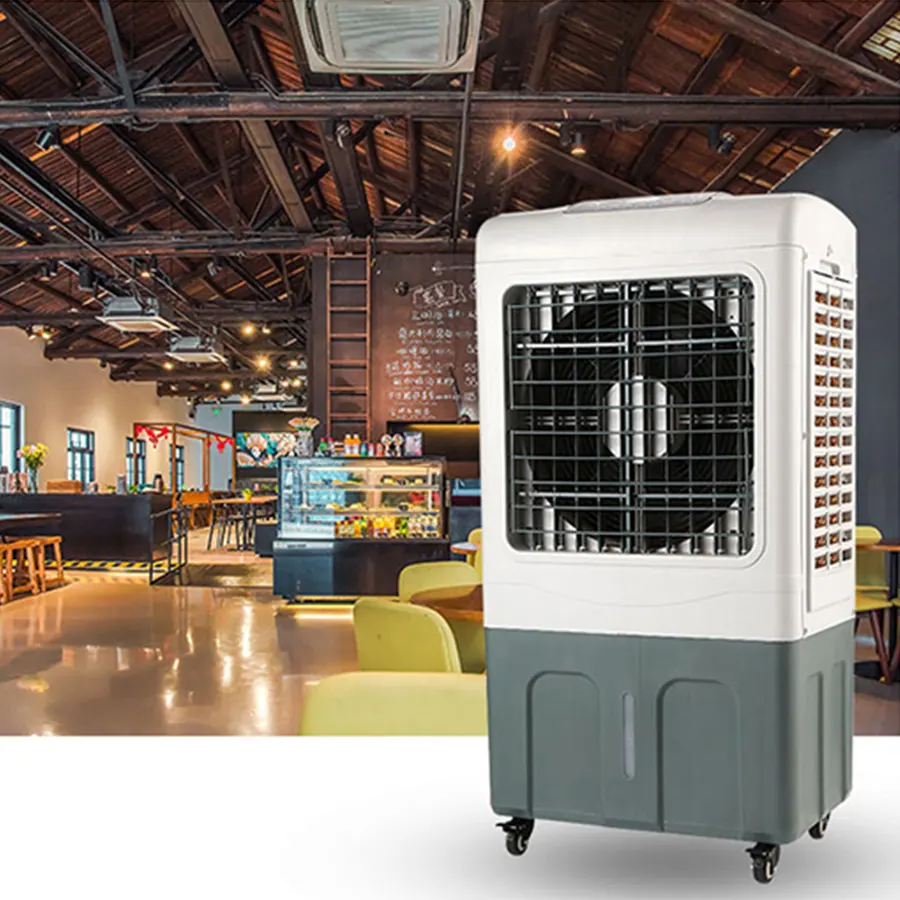
Eficiência Energética
Um dos principais benefícios dos refrigeradores de ar é a sua eficiência energética. Comparado aos ar condicionados, refrigeradores de ar consomem significativamente menos eletricidade. Isso ocorre porque eles operam com base em um princípio simples: um ventilador sopra ar através de almofadas de resfriamento encharcadas de água, que resfria o ar por evaporação. Não há necessidade de um compressor que consome muita energia ou de um ciclo de refrigerante como nos aparelhos de ar condicionado. Isto torna os refrigeradores de ar uma escolha ideal para quem procura reduzir os custos de energia, especialmente durante os meses quentes de verão.
Custo mais baixo
O custo inicial de um refrigerador de ar é substancialmente menor do que o de um ar condicionado. Eles não são apenas mais acessíveis para compra, mas os custos operacionais e de manutenção também são mínimos. Os refrigeradores de ar não requerem refrigerantes caros ou manutenção complexa, o que os torna uma opção econômica, especialmente para pessoas em casas pequenas, apartamentos, ou para resfriar pequenos espaços como quartos e escritórios.
Ecologicamente correto
Ao contrário dos aparelhos de ar condicionado, que dependem de produtos químicos e refrigerantes que podem ser prejudiciais ao meio ambiente, refrigeradores de ar são muito mais ecológicos. Eles usam métodos naturais de resfriamento por meio da evaporação da água, o que significa que eles têm uma pegada de carbono muito menor. Uma vez que não requerem refrigerantes prejudiciais, refrigeradores de ar apresentam uma solução mais sustentável e verde para resfriamento.
Vantagens dos condicionadores de ar
Os condicionadores de ar oferecem resfriamento potente, desempenho consistente em todos os climas, e melhor qualidade do ar, tornando-os uma escolha ideal para quem procura conforto confiável em ambientes quentes e úmidos.
Resfriamento poderoso
Quando se trata de potência de resfriamento, os condicionadores de ar estão em uma categoria à parte. Eles podem lidar facilmente grandes espaços e manter uma consistência, temperatura confortável mesmo no calor mais intenso. Quer você esteja resfriando uma espaçosa sala de estar ou uma casa inteira, os condicionadores de ar são projetados para fornecer resfriamento forte e confiável, tornando-os ideais para áreas com temperaturas extremas.
Eficaz em qualquer clima
Ao contrário dos refrigeradores de ar, que dependem ar seco para uma operação eficaz, condicionadores de ar pode funcionar perfeitamente em qualquer clima, se úmido ou seco. Como os aparelhos de ar condicionado não dependem da evaporação, eles são igualmente eficientes em áreas com alta umidade, onde os refrigeradores de ar podem ter dificuldades. Isso os torna uma opção versátil e confiável para resfriamento consistente em qualquer tipo de condição climática.
Melhor qualidade do ar
Uma vantagem significativa dos aparelhos de ar condicionado modernos é a sua capacidade de melhorar a qualidade do ar. Muitas unidades AC estão equipadas com filtros que capturam poeira, pólen, pêlos de animais, e outros alérgenos do ar. Isso os torna uma ótima opção para pessoas com alergias ou problemas respiratórios, como o limpo, o ar filtrado pode criar um ambiente mais saudável, reduzindo a presença de partículas nocivas no ar.
Refrigerador de ar ou AC: Qual é o melhor?
Ao decidir entre um refrigerador de ar e um ar condicionado, há vários fatores importantes a serem considerados para fazer a melhor escolha para suas necessidades.
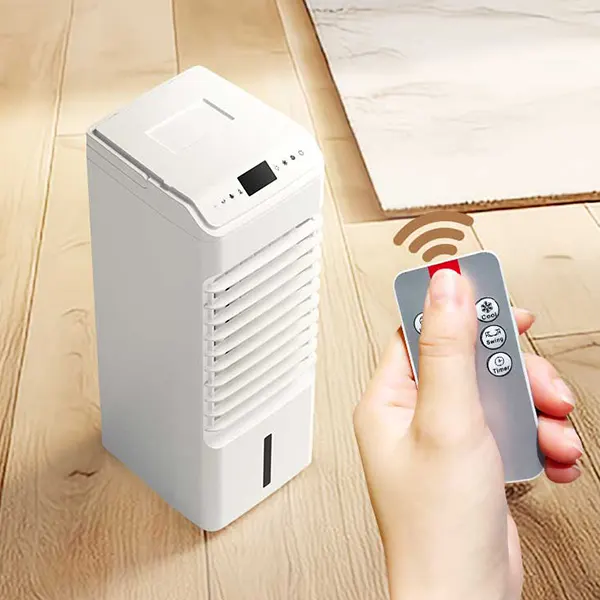
Considere o clima
Os refrigeradores de ar são mais eficazes em ambientes secos, climas áridos onde podem utilizar o processo de resfriamento evaporativo para baixar a temperatura. Eles funcionam bem em áreas onde o ar está seco e podem se beneficiar com a adição de umidade. No entanto, em ambientes úmidos, refrigeradores de ar podem ter dificuldade para resfriar com eficácia, já que a umidade adicionada ao ar limita o processo de evaporação. Por outro lado, os aparelhos de ar condicionado são perfeitos para qualquer clima, seja quente, úmido, ou seco. Eles não dependem de umidade e fornecem consistência, resfriamento poderoso em todas as condições climáticas.
Considere o orçamento
Quando se trata de custo, refrigeradores de ar são significativamente mais econômicos. Têm um preço inicial de compra mais baixo e são mais baratos de operar devido ao menor consumo de energia. Se você está com um orçamento apertado ou precisa de uma solução de refrigeração para um espaço menor, um refrigerador de ar pode ser o caminho a percorrer. Ar condicionado, embora seja mais caro antecipadamente, oferecem capacidades de resfriamento superiores, especialmente em espaços ou casas maiores. Eles também vêm com custos operacionais mais elevados, pois consomem mais energia devido aos seus complexos sistemas de refrigeração. Se você estiver disposto a investir mais inicialmente para conforto de refrigeração a longo prazo, um AC pode ser sua melhor opção.
Considere o espaço
O tamanho do seu espaço é outro fator chave na escolha entre um refrigerador de ar e um ar condicionado. Os refrigeradores de ar são mais adequados para salas menores ou áreas individuais. Eles são portáteis e podem ser facilmente movidos de sala em sala, tornando-os ideais para pessoas em apartamentos ou casas menores. Se você tem um cômodo maior ou precisa resfriar uma casa inteira, um ar condicionado central fornecerá um resfriamento mais potente e consistente. Os aparelhos de ar condicionado são projetados para lidar com espaços maiores de forma mais eficaz, garantindo uma distribuição uniforme da temperatura em toda a área.
Considere as prioridades
Por último, pense no que é mais importante para você. Se a sua principal prioridade é o máximo resfriamento e a capacidade de enfrentar condições de umidade, então um ar condicionado é a escolha certa. ACs oferecem poderosa, resfriamento consistente e também melhora a qualidade do ar filtrando a poeira, pólen, e outros alérgenos. No entanto, se você está focado na eficiência energética, economia de custos, e uma opção mais ecológica, um refrigerador de ar é a melhor opção. Os refrigeradores de ar são ótimos para calor seco e são uma maneira econômica de manter a calma sem usar muita eletricidade.
Em última análise, a escolha entre um refrigerador de ar e um ar condicionado depende de suas necessidades específicas, preferências, e o clima em que você vive.
Conclusão
A escolha entre um refrigerador de ar ou AC depende de suas necessidades específicas. Se você está procurando um custo-benefício, solução energeticamente eficiente para um clima seco, um refrigerador de ar pode ser sua melhor aposta. No entanto, se você precisar de resfriamento potente para um espaço grande ou ambiente úmido, um ar condicionado é a escolha mais eficaz. Considere fatores como o clima, orçamento, espaço, e requisitos de refrigeração para tomar a decisão certa para sua casa.
Perguntas frequentes
1. O que é melhor para um clima úmido, um refrigerador de ar ou um AC?
Um ar condicionado é mais adequado para um clima úmido. Embora os refrigeradores de ar dependam do resfriamento evaporativo, o que pode realmente aumentar a umidade, os condicionadores de ar podem remover com eficácia o calor e a umidade do ar, proporcionando um ambiente mais confortável em condições úmidas.
2. Os refrigeradores de ar são energeticamente eficientes em comparação com os ACs??
Sim, refrigeradores de ar são geralmente mais eficientes em termos energéticos do que condicionadores de ar. Eles usam menos eletricidade porque dependem de um ventilador e da evaporação da água, enquanto os condicionadores de ar usam compressores e refrigerantes, que consomem significativamente mais energia.
3. Um refrigerador de ar pode funcionar de maneira eficaz em uma sala grande?
Um refrigerador de ar pode funcionar em uma sala grande, mas a sua eficácia de refrigeração pode ser limitada em comparação com um ar condicionado. O tamanho da sala e a temperatura ambiente desempenham um papel. Os refrigeradores de ar são mais eficazes em espaços pequenos e médios e em climas secos. Para áreas maiores, um refrigerador de maior capacidade ou um ar condicionado pode ser mais adequado.
4. Quais são os requisitos de manutenção para cada?
Os refrigeradores de ar requerem limpeza regular das almofadas de resfriamento, tanque de água, e filtrar, bem como trocar a água com frequência para evitar o crescimento de mofo ou bactérias. Em comparação, condicionadores de ar precisam de manutenção periódica, incluindo substituições de filtros, verificações de refrigerante, e limpeza geral para manter a eficiência e evitar quebras.
5. Qual opção é mais econômica no longo prazo?
Os refrigeradores de ar são mais econômicos no longo prazo devido ao seu custo inicial mais baixo e ao consumo mínimo de eletricidade. Por outro lado, condicionadores de ar tendem a ter custos iniciais mais altos, e o seu maior consumo de energia pode levar a contas de eletricidade mais altas ao longo do tempo. No entanto, se você precisar de consistência, resfriamento potente em espaços maiores ou mais úmidos, um ar condicionado pode justificar o investimento.
6. AC ou refrigerador de ar: O que é melhor para a saúde?
Um refrigerador de ar é geralmente considerado melhor para a saúde, pois adiciona umidade ao ar, que pode ajudar a prevenir a secura da pele e do sistema respiratório, especialmente em climas secos. Também não circula alérgenos ou poeira tanto quanto os aparelhos de ar condicionado, mas falta a filtragem que os ACs fornecem. Os condicionadores de ar podem melhorar a qualidade do ar, filtrando a poeira, pólen, e outros alérgenos, mas eles também podem secar o ar, o que pode causar desconforto para alguns indivíduos.
7. O refrigerador de ar consome mais eletricidade do que CA?
Não, um refrigerador de ar normalmente consome muito menos eletricidade do que um ar condicionado. Os refrigeradores de ar operam usando um ventilador e evaporação de água, que requer energia mínima, enquanto os condicionadores de ar usam compressores e refrigerantes, consumindo mais eletricidade para o processo de resfriamento.


